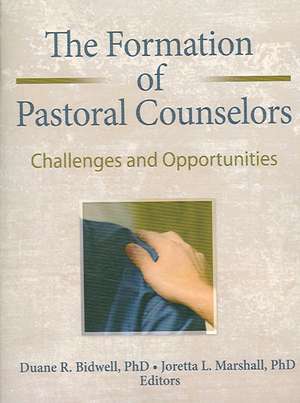The Formation of Pastoral Counselors: Challenges and Opportunities
Editat de Duane R. Bidwell, Joretta L. Marshallen Limba Engleză Paperback – 2 apr 2007
Two dozen of the most prominent clinicians and scholars in the field reflect on The Formation of Pastoral Counselors from clinical, theological and theoretical perspectives. This unique book explores the challenges to the personal and professional formation of pastoral counselors in a cultural and historic context that’s radically different from the era when the profession first emerged as a specialized ministry. Contributors examine formation from a variety of contexts and perspectives, including spirituality and gender, address theological education and intercultural issues, and present emerging models for pastoral counselors.
The Formation of Pastoral Counselors is a practical guide for educators working to shape curricula and training programs to the shifting context in which pastoral counselors are formed for ministry, service, and lifelong learning. This unique book examines ideas about appropriate content and processes for the formation of pastoral care professionals and looks at specialized contextual training models that form their emerging identities. The book’s contributors call on extensive experience in pastoral theology, care, and counseling to explore the essential components of formation across different contexts; how those contextual realities change the delivery systems; the epistemological nature of formation; reasons for the limited roles that formal theological education and spiritual experience seem to play at the moment; and why formation is rarely formally addressed in pastoral counseling training.
Topics discussed in The Formation of Pastoral Counselors include:
- the turn to formation
- the goals of theological education
- core elements of pastoral theology
- developing spiritual practices
- diversity
- pastoral counseling training programs
- race and ethnicity in the formation of pastoral counselors
- cultural identity
- intercultural contexts
- practical relevancy in training
- gender identity and sexual orientation
- economic disparity Models and practices examined in The Formation of Pastoral Counselors include:
- parallel charting
- clinician narratives
- group supervision
- Benedictine spirituality
- academic and clinical training at the Claremont School of Theology
- the model of formation at the Virginia Institute of Pastoral Care (VIPCare)
- and much more
The Formation of Pastoral Counselors is an essential guide for pastoral counselors, faculty in pastoral theological care and counseling, and training directors in pastoral counseling centers.
Preț: 456.62 lei
Preț vechi: 620.35 lei
-26% Nou
Puncte Express: 685
Preț estimativ în valută:
87.37€ • 91.47$ • 72.30£
87.37€ • 91.47$ • 72.30£
Carte tipărită la comandă
Livrare economică 07-21 aprilie
Preluare comenzi: 021 569.72.76
Specificații
ISBN-13: 9780789032966
ISBN-10: 0789032961
Pagini: 244
Dimensiuni: 148 x 210 x 17 mm
Greutate: 0.45 kg
Ediția:1
Editura: Taylor & Francis
Colecția Routledge
Locul publicării:Oxford, United Kingdom
ISBN-10: 0789032961
Pagini: 244
Dimensiuni: 148 x 210 x 17 mm
Greutate: 0.45 kg
Ediția:1
Editura: Taylor & Francis
Colecția Routledge
Locul publicării:Oxford, United Kingdom
Cuprins
About the Contributors. van den Blink, Kornfeld, Foreword. Introduction. Bidwell, Marshall, Formation: Content, Context, Models and Practices. Section I: Content and Context. Graham, Whitehead, The Role of Pastoral Theology in Theological Education for the Formation of Pastoral Counselors. Townsend, Theological Reflection and the Formation of Pastoral Counselors. Cooper-White, Thick Theory: Psychology, Theoretical Models, and the Formation of Pastoral Counselors. Driskill, Spirituality and the Formation of Pastoral Counselors. Graham, Race and Ethnicity in the Formation of Pastoral Counselors. Mucherera, Pastoral Formation of Counselors in Intercultural Societies. Marshall, Gender Identity, Sexual Orientation, and Pastoral Formation. Jacque, Formation in the Context of Economic Disparity. Section II: Models and Practices. Bidwell, Formation Through Parallel Charting: Clinician Narratives and Group Supervision. Watts, Reynolds, A Model for the Spiritual Formation of a Pastoral Counseling Center. Radillo, A Model of Formation in the Multi-Cultural Urban Context for the Pastoral Care Specialist. Greider, Clements, Lee, Formation for Care of Souls: The Claremont Way. Hill, Bonnasue, Slemp, Malay, A Model of Formation: The Virginia Institute of Pastoral Care. Mendenhall, Ronsheim, Expanding the Context of Care: Formation from the Inside Out and the Outside In. Index. Reference Notes Included.
Notă biografică
Duane R. Bidwell, PhD, is Director of the Pastoral Care and Training Center, an AAPC-accredited training and service center at Brite Divinity School at Texas Christian University in Fort Worth, where he also teaches pastoral theology, care, and counseling. A certified pastoral counselor since 2000, Dr. Bidwell serves as vice-president of the Southwest Region of the American Association of Pastoral Counselors. Joretta L. Marshall, PhD, is Professor of Pastoral Theology and Care at Eden Theological Seminary in St. Louis, Missouri. Prior to joining the faculty at Eden, Dr. Marshall served on the faculties of Vanderbilt University Divinity School (1989-1993) and Iliff School of Theology (1993-2001). She is an American Association of Pastoral Counselors Fellow and has been a member since of AAPC since 1991. Dr. Marshall's work in pastoral care and counseling focuses on issues of gender, sexuality, developmental theory, forgiveness, pedagogy in theological education, and prophetic pastoral care.
Descriere
Two dozen of the most prominent clinicians and scholars in the field reflect on The Formation of Pastoral Counselors from clinical, theological, and theoretical perspectives. This unique book explores the challenges to the personal and professional formation of pastoral counselors in a cultural and historic context that's radically different from the era when the profession first emerged as a specialized ministry. Contributors examine formation from a variety of contexts and perspectives, including spirituality and gender, address theological education and intercultural issues, and present emerging models for pastoral counselors.
